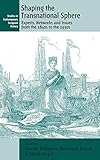Shaping the Transnational Sphere : Experts, Networks and Issues from the 1840s to the 1930s / ed. by Bernhard Struck, Davide Rodogno, Jakob Vogel.
Material type: TextSeries: Contemporary European History ; 14Publisher: New York ; Oxford : Berghahn Books, [2014]Copyright date: ©2014Description: 1 online resource (320 p.)Content type:
TextSeries: Contemporary European History ; 14Publisher: New York ; Oxford : Berghahn Books, [2014]Copyright date: ©2014Description: 1 online resource (320 p.)Content type: - 9781782383581
- 9781782383598
- Expertise -- Social aspects -- History
- Intellectual cooperation -- History
- International agencies -- History
- International cooperation -- History
- Social planning -- International cooperation -- History
- Transnationalism -- History
- HISTORY / Modern / 19th Century
- History: 18th/19th Century, History: 20th Century to Present
- 327.09034 23
- online - DeGruyter
| Item type | Current library | Call number | URL | Status | Notes | Barcode | |
|---|---|---|---|---|---|---|---|
 eBook
eBook
|
Biblioteca "Angelicum" Pont. Univ. S.Tommaso d'Aquino Nuvola online | online - DeGruyter (Browse shelf(Opens below)) | Online access | Not for loan (Accesso limitato) | Accesso per gli utenti autorizzati / Access for authorized users | (dgr)9781782383598 |
Frontmatter -- Contents -- Illustrations -- Tables -- Acknowledgements -- Abbreviations -- Introduction -- Part I Experts -- Chapter 1 Professionalism or Proselytism? Catholic ‘Internationalists’ in the Nineteenth Century -- Chapter 2 Sanitizing the City The Transnational Work and Networks of French Sanitary Engineers, 1890s–1930s -- Chapter 3 Policy Communities and Exchanges across Borders The Case of Workplace Accidents at the Turn of the Twentieth Century -- Chapter 4 The Rise of Coordinated Action for Children in War and Peace Experts at the League of Nations, 1924–1945 -- Part II Networks -- Chapter 5 Building a Transnational Network of Social Reform in the Nineteenth Century -- Chapter 6 The Politics of Expertise The Association Internationale pour le Progrès des Sciences Sociales, Democratic Peace Movements and International Law Networks in Europe, 1850–1875 -- Chapter 7 The Road from Damascus Transnational Jewish Philanthropic Organizations and the Jewish Mass Migration from Eastern Europe, 1840–1914 -- Chapter 8 From Peace Advocacy to International Relations Research The Transformation of Transatlantic Philanthropic Networks, 1900–1930 -- Part III Issues -- Chapter 9 Transnational Cooperation and Criminal Policy The Prison Reform Movement, 1820s–1950s -- Chapter 10 International Congress es of Education and the Circulation of Pedagogical Knowledge in Western Europe, 1876–1910 -- Chapter 11 From Transnational Reformist Network to International Organization The International Association for Labour Legislation and the International Labour Organization, 1900–1930s -- Chapter 12 Shaping Poland Relief and Rehabilitation Programmes Undertaken by Foreign Organizations, 1918–1922 -- Select Bibliography -- Notes on Contributors -- Index
restricted access online access with authorization star
http://purl.org/coar/access_right/c_16ec
In the second half of the nineteenth century a new kind of social and cultural actor came to the fore: the expert. During this period complex processes of modernization, industrialization, urbanization, and nation-building gained pace, particularly in Western Europe and North America. These processes created new forms of specialized expertise that grew in demand and became indispensible in fields like sanitation, incarceration, urban planning, and education. Often the expertise needed stemmed from problems at a local or regional level, but many transcended nation-state borders. Experts helped shape a new transnational sphere by creating communities that crossed borders and languages, sharing knowledge and resources through those new communities, and by participating in special events such as congresses and world fairs.
Mode of access: Internet via World Wide Web.
In English.
Description based on online resource; title from PDF title page (publisher's Web site, viewed 25. Jun 2024)


